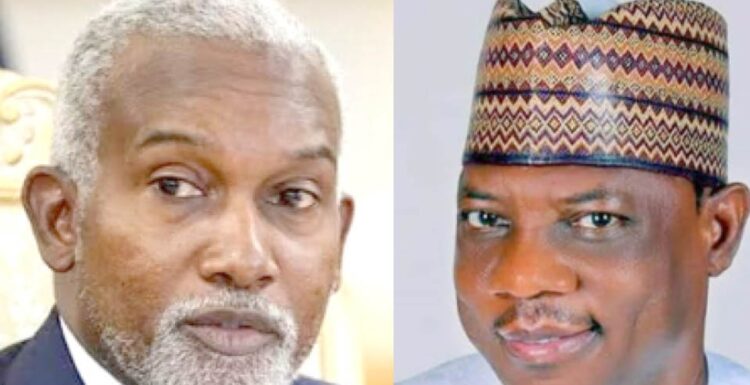News
Reps Link Corruption to Weak Auditing, Calls for Reform

By Gloria Ikibah
The House of Representatives has identified weaknesses in Nigeria’s auditing and accounting systems as major enablers of corruption, leading to significant revenue losses and undermining development efforts.
Chairman of the Public Accounts Committee (PAC), Rep. Bamidele Salam, made this assertion during the budget defense session with the Office of the Auditor General for the Federation (OAuGF).
He stressed that the deficiencies in the nation’s financial management systems have created loopholes that facilitate impunity in government agencies.
“There are substantial funds that should flow into government coffers but are lost due to weaknesses in our accounting systems, auditing practices, and financial management framework,” Salam noted.
The Chairman who emphasised inadequate auditing of key revenue-generating agencies as a major concern, added that the lack of proper oversight encourages financial mismanagement.
“When agencies are not audited thoroughly, it signals neglect and promotes impunity. This has been an ongoing issue due to budgetary and personnel constraints faced by the Auditor General’s office,” Salam said.
The PAC Chairman called for increased funding and staffing for the Auditor General’s office, and highlighted the importance of preventive measures in tackling corruption. “If the Auditor General’s office is well-funded and properly staffed, we can significantly reduce corruption by preventing it before it happens rather than reacting afterward,” he stated.
Salam also criticized the poor implementation of the capital component of the 2024 budget, warning that it negatively impacts governance and development goals. He urged the government to focus on boosting revenue rather than relying on borrowing. “Blocking revenue loopholes is critical. Strengthening our revenue systems will reduce our dependence on borrowing,” he added.
He further urged the Auditor General’s office to expedite the submission of annual reports, which are vital for the National Assembly’s oversight of the executive. Salam pointed out that Nigeria lags behind countries like Kenya, where audited financial reports are submitted more promptly.
In his response, the Auditor General for the Federation, Shaakaa Kanyitor Chira, outlined the challenges his office faces, including inadequate funding and a shortage of staff. These issues, he explained, have delayed the compilation and submission of annual reports.
Chira assured the committee that efforts are underway to address these challenges, pledging to clear the backlog of reports. “By March, we aim to submit the 2022 domestic report and the consolidated financial report. With adequate funding and staffing, we can improve our operations significantly,” he said.
The committee therefore pledged to collaborate with other parliamentary committees to enhance the effectiveness of the Auditor General’s office, ensuring greater accountability and transparency in the management of public funds.
News
UPDATED: How Pope Francis transited, last activity, health challenges, others

Pope Francis, history’s first Latin American pontiff who charmed the world with his humble style and concern for the poor but alienated conservatives with critiques of capitalism and climate change, died Monday. He was 88.
Bells tolled in church towers across Rome after the announcement, which was read out by Cardinal Kevin Farrell from the chapel of the Domus Santa Marta, where Francis lived.
“At 7:35 this morning, the Bishop of Rome, Francis, returned to the home of the Father. His entire life was dedicated to the service of the Lord and of his Church,” said Farrell, the Vatican camerlengo, who takes charge after a pontiff’s death.
Francis, who suffered from chronic lung disease and had part of one lung removed as a young man, was admitted to Gemelli hospital on Feb. 14, 2025, for a respiratory crisis that developed into double pneumonia. He spent 38 days there, the longest hospitalization of his 12-year papacy.
He emerged on Easter Sunday — his last public appearance, a day before his death — to bless thousands of people in St. Peter’s Square and treat them to a surprise popemobile romp through the piazza, drawing wild cheers and applause. Beforehand, he met briefly with U.S. Vice President JD Vance.
Francis performed the blessing from the same loggia where he was introduced to the world on March 13, 2013 as the 266th pope.
From his first greeting that night — a remarkably normal “Buonasera” (“Good evening”) — to his embrace of refugees and the downtrodden, Francis signaled a very different tone for the papacy, stressing humility over hubris for a Catholic Church beset by scandal and accusations of indifference.
After that rainy night, the Argentine-born Jorge Mario Bergoglio brought a breath of fresh air into a 2,000-year-old institution that had seen its influence wane during the troubled tenure of Pope Benedict XVI, whose surprise resignation led to Francis’ election.
But Francis soon invited troubles of his own, and conservatives grew increasingly upset with his progressive bent, outreach to LGBTQ+ Catholics and crackdown on traditionalists. His greatest test came in 2018 when he botched a notorious case of clergy sexual abuse in Chile, and the scandal that festered under his predecessors erupted anew on his watch.
And then Francis, the crowd-loving, globe-trotting pope of the peripheries, navigated the unprecedented reality of leading a universal religion through the coronavirus pandemic from a locked-down Vatican City.
He implored the world to use COVID-19 as an opportunity to rethink the economic and political framework that he said had turned rich against poor.
“We have realized that we are on the same boat, all of us fragile and disoriented,” Francis told an empty St. Peter’s Square in March 2020. But he also stressed the pandemic showed the need for “all of us to row together, each of us in need of comforting the other.”
At the Vatican on Monday, the mood was a mix of somber quiet among people who knew and worked for Francis, and the typical buzz of tourists visiting St. Peter’s Square on the day after Easter. While many initially didn’t know the news, some sensed something happening given the swarms of television crews.
The Vatican spokesman, Matteo Bruni, meanwhile, wiped tears from his eyes as he met with journalists in the press room.
Francis’ death sets off a weekslong process of allowing the faithful to pay their final respects, first for Vatican officials in the Santa Marta chapel and then in St. Peter’s for the general public, followed by a funeral and a conclave to elect a new pope.
Reforming the Vatican
Francis was elected on a mandate to reform the Vatican bureaucracy and finances but went further in shaking up the church without changing its core doctrine. “Who am I to judge?” he replied when asked about a purportedly gay priest.
The comment sent a message of welcome to the LGBTQ+ community and those who felt shunned by a church that had stressed sexual propriety over unconditional love. “Being homosexual is not a crime,” he told The Associated Press in 2023, urging an end to civil laws that criminalize it.
Stressing mercy, Francis changed the church’s position on the death penalty, calling it inadmissible in all circumstances. He also declared the possession of nuclear weapons, not just their use, was “immoral.”
In other firsts, he approved an agreement with China over bishop nominations that had vexed the Vatican for decades, met the Russian patriarch and charted new relations with the Muslim world by visiting the Arabian Peninsula and Iraq.
He reaffirmed the all-male, celibate priesthood and upheld the church’s opposition to abortion, equating it to “hiring a hit man to solve a problem.”
Roles for women
But he added women to important decision-making roles and allowed them to serve as lectors and acolytes in parishes. He let women vote alongside bishops in periodic Vatican meetings, following long-standing complaints that women do much of the church’s work but are barred from power.
Sister Nathalie Becquart, whom Francis named to one of the highest Vatican jobs, said his legacy was a vision of a church where men and women existed in a relationship of reciprocity and respect.
“It was about shifting a pattern of domination — from human being to the creation, from men to women — to a pattern of cooperation,” said Becquart, the first woman to hold a voting position in a Vatican synod.
Still, a note of criticism came from the Women’s Ordination Conference, which had been frustrated by Francis’ unwillingness to push for the ordination of women.
“His repeated ‘closed door’ policy on women’s ordination was painfully incongruous with his otherwise pastoral nature, and for many, a betrayal of the synodal, listening church he championed. This made him a complicated, frustrating, and sometimes heart-breaking figure for many women,” the statement said.
The church as refuge
While Francis did not allow women to be ordained, the voting reform was part of a revolutionary change in emphasizing what the church should be: a refuge for everyone — “todos, todos, todos” (“everyone, everyone, everyone”) — not for the privileged few. Migrants, the poor, prisoners and outcasts were invited to his table far more than presidents or powerful CEOs.
“For Pope Francis, (the goal) was always to extend the arms of the church to embrace all people, not to exclude anyone,” said Farrell, the camerlengo.
Francis demanded his bishops apply mercy and charity to their flocks, pressed the world to protect God’s creation from climate disaster, and challenged countries to welcome those fleeing war, poverty and oppression.
After visiting Mexico in 2016, Francis said of then-U.S. presidential candidate Donald Trump that anyone building a wall to keep migrants out “is not Christian.”
While progressives were thrilled with Francis’ radical focus on Jesus’ message of mercy and inclusion, it troubled conservatives who feared he watered down Catholic teaching and threatened the very Christian identity of the West. Some even called him a heretic.
A few cardinals openly challenged him. Francis usually responded with his typical answer to conflict: silence.
He made it easier for married Catholics to get an annulment, allowed priests to absolve women who had had abortions and decreed that priests could bless same-sex couples. He opened debate on issues like homosexuality and divorce, giving pastors wiggle room to discern how to accompany their flocks, rather than handing them strict rules to apply.
St. Francis of Assisi as a model
Francis lived in the Vatican hotel instead of the Apostolic Palace, wore his old orthotic shoes and not the red loafers of the papacy, and rode in compact cars. It wasn’t a gimmick.
“I see clearly that the thing the church needs most today is the ability to heal wounds and to warm the hearts of the faithful,” he told a Jesuit journal in 2013. “I see the church as a field hospital after battle.”
If becoming the first Latin American and first Jesuit pope wasn’t enough, Francis was also the first to name himself after St. Francis of Assisi, the 13th century friar known for personal simplicity, a message of peace, and care for nature and society’s outcasts.
Francis sought out the unemployed, the sick, the disabled and the homeless. He formally apologized to Indigenous peoples for the crimes of the church from colonial times onward.
And he himself suffered: He had part of his colon removed in 2021, then needed more surgery in 2023 to repair a painful hernia and remove intestinal scar tissue. Starting in 2022 he regularly used a wheelchair or cane because of bad knees, and endured bouts of bronchitis.
He went to society’s fringes to minister with mercy: caressing the deformed head of a man in St. Peter’s Square, kissing the tattoo of a Holocaust survivor, or inviting Argentina’s garbage scavengers to join him onstage in Rio de Janeiro.
“We have always been marginalized, but Pope Francis always helped us,” said Coqui Vargas, a transgender woman whose Roman community forged a unique relationship with Francis during the pandemic.
His first trip as pope was to the island of Lampedusa, then the epicenter of Europe’s migration crisis. He consistently chose to visit poor countries where Christians were often persecuted minorities, rather than the centers of global Catholicism.
Friend and fellow Argentine, Bishop Marcelo Sánchez Sorondo, said his concern for the poor and disenfranchised was based on the Beatitudes — the eight blessings Jesus delivered in the Sermon on the Mount for the meek, the merciful, the poor in spirit and others.
“Why are the Beatitudes the program of this pontificate? Because they were the basis of Jesus Christ’s own program,” Sánchez said.
Missteps on sexual abuse scandal
But more than a year passed before Francis met with survivors of priestly sexual abuse, and victims’ groups initially questioned whether he really understood the scope of the problem.
Francis did create a sex abuse commission to advise the church on best practices, but it lost influence after a few years and its recommendation of a tribunal to judge bishops who covered up for predator priests went nowhere.
And then came the greatest crisis of his papacy, when he discredited Chilean abuse victims in 2018 and stood by a controversial bishop linked to their abuser. Realizing his error, Francis invited the victims to the Vatican for a personal mea culpa and summoned the leadership of the Chilean church to resign en masse.
As that crisis concluded, a new one erupted over ex-Cardinal Theodore McCarrick, the retired archbishop of Washington and a counselor to three popes.
Francis had actually moved swiftly to sideline McCarrick amid an accusation he had molested a teenage altar boy in the 1970s. But Francis nevertheless was accused by the Vatican’s one-time U.S. ambassador of having rehabilitated McCarrick early in his papacy.
Francis eventually defrocked McCarrick after a Vatican investigation determined he sexually abused adults as well as minors. He changed church law to remove the pontifical secret surrounding abuse cases and enacted procedures to investigate bishops who abused or covered for their pedophile priests, seeking to end impunity for the hierarchy.
“He sincerely wanted to do something and he transmitted that,” said Juan Carlos Cruz, a Chilean abuse survivor Francis discredited who later developed a close friendship with the pontiff.
A change from Benedict
The road to Francis’ 2013 election was paved by Pope Benedict XVI’s decision to resign and retire — the first in 600 years — and it created the unprecedented reality of two popes living in the Vatican.
Francis didn’t shy from Benedict’s potentially uncomfortable shadow. He embraced him as an elder statesman and adviser, coaxing him out of his cloistered retirement to participate in the public life of the church.
“It’s like having your grandfather in the house, a wise grandfather,” Francis said.
Francis praised Benedict by saying he “opened the door” to others following suit, fueling speculation that Francis also might retire. But after Benedict’s death on Dec. 31, 2022, he asserted that in principle the papacy is a job for life.
Francis’ looser liturgical style and pastoral priorities made clear he and the German-born theologian came from very different religious traditions, and Francis directly overturned several decisions of his predecessor.
He made sure Salvadoran Archbishop Óscar Romero, a hero to the liberation theology movement in Latin America, was canonized after his case languished under Benedict over concerns about the credo’s Marxist bent.
Francis reimposed restrictions on celebrating the old Latin Mass that Benedict had relaxed, arguing the spread of the Tridentine Rite was divisive. The move riled Francis’ traditionalist critics and opened sustained conflict between right-wing Catholics, particularly in the U.S., and the Argentine pope.
Conservatives oppose Francis
By then, conservatives had already turned away from Francis, betrayed after he opened debate on allowing remarried Catholics to receive the sacraments if they didn’t get an annulment — a church ruling that their first marriage was invalid.
“We don’t like this pope,” headlined Italy’s conservative daily Il Foglio a few months into the papacy, reflecting the unease of the small but vocal traditionalist Catholic movement.
Those same critics amplified their complaints after Francis’ approved church blessings for same-sex couples, and a controversial accord with China over nominating bishops.
Its details were never released, but conservative critics bashed it as a sellout to communist China, while the Vatican defended it as the best deal it could get with Beijing.
U.S. Cardinal Raymond Burke, a figurehead in the anti-Francis opposition, said the church had become “like a ship without a rudder.”
Burke waged his opposition campaign for years, starting when Francis fired him as the Vatican’s supreme court justice and culminating with his vocal opposition to Francis’ 2023 synod on the church’s future.
Twice, he joined other conservative cardinals in formally asking Francis to explain himself on doctrine issues reflecting a more progressive bent, including on the possibility of same-sex blessings and his outreach to divorced and civilly remarried Catholics.
Francis eventually sanctioned Burke financially, accusing him of sowing “disunity.”
Francis insisted his bishops and cardinals imbue themselves with the “odor of their flock” and minister to the faithful, voicing displeasure when they didn’t.
His 2014 Christmas address to the Vatican Curia was one of the greatest public papal reprimands ever: Standing in the marbled Apostolic Palace, Francis ticked off 15 ailments that he said can afflict his closest collaborators, including “spiritual Alzheimer’s,” lusting for power and the “terrorism of gossip.”
Trying to eliminate corruption, Francis oversaw the reform of the scandal-marred Vatican bank and sought to wrestle Vatican bureaucrats into financial line, limiting their compensation and ability to receive gifts or award public contracts.
He authorized Vatican police to raid his own secretariat of state and the Vatican’s financial watchdog agency amid suspicions about a 350 million euro investment in a London real estate venture. After a 2 1/2-year trial, the Vatican tribunal convicted a once-powerful cardinal, Angelo Becciu, of embezzlement and returned mixed verdicts to nine others, acquitting one.
The trial, though, proved to be a reputational boomerang for the Holy See, showing deficiencies in the Vatican’s legal system, unseemly turf battles among monsignors, and how the pope had intervened on behalf of prosecutors.
While earning praise for trying to turn the Vatican’s finances around, Francis angered U.S. conservatives for his frequent excoriation of the global financial market.
Economic justice was an important themes of his papacy, and he didn’t hide it in his first meeting with journalists when he said he wanted a “poor church that is for the poor.”
In his first major teaching document, “The Joy of the Gospel,” Francis denounced trickle-down economic theories as unproven and naive, based on a mentality “where the powerful feed upon the powerless” with no regard for ethics, the environment or even God.
“Money must serve, not rule!” he said in urging political reforms.
Some U.S. conservatives branded Francis a Marxist. He jabbed back by saying he had many friends who were Marxists.
Soccer, opera and prayer
Born Dec. 17, 1936, in Buenos Aires, Jorge Mario Bergoglio was the eldest of five children of Italian immigrants.
He credited his devout grandmother Rosa with teaching him how to pray. Weekends were spent listening to opera on the radio, going to Mass and attending matches of the family’s beloved San Lorenzo soccer club. As pope, his love of soccer brought him a huge collection of jerseys from visitors.
He said he received his religious calling at 17 while going to confession, recounting in a 2010 biography that, “I don’t know what it was, but it changed my life. … I realized that they were waiting for me.”
He entered the diocesan seminary but switched to the Jesuit order in 1958, attracted to its missionary tradition and militancy.
Around this time, he suffered from pneumonia, which led to the removal of the upper part of his right lung. His frail health prevented him from becoming a missionary, and his less-than-robust lung capacity was perhaps responsible for his whisper of a voice and reluctance to sing at Mass.
On Dec. 13, 1969, he was ordained a priest, and immediately began teaching. In 1973, he was named head of the Jesuits in Argentina, an appointment he later acknowledged was “crazy” given he was only 36. “My authoritarian and quick manner of making decisions led me to have serious problems and to be accused of being ultraconservative,” he admitted in his Civilta Cattolica interview.
Life under Argentina’s dictatorship
His six-year tenure as the head of the order in Argentina coincided with the country’s murderous 1976-83 dictatorship, when the military launched a campaign against left-wing guerrillas and other regime opponents.
Bergoglio didn’t publicly confront the junta and was accused of effectively allowing two slum priests to be kidnapped and tortured by not publicly endorsing their work.
He refused for decades to counter that version of events. Only in a 2010 authorized biography did he finally recount the behind-the-scenes lengths he used to save them, persuading the family priest of feared dictator Jorge Videla to call in sick so he could celebrate Mass instead. Once in the junta leader’s home, Bergoglio privately appealed for mercy. Both priests were eventually released, among the few to have survived prison.
As pope, accounts began to emerge of the many people — priests, seminarians and political dissidents —whom Bergoglio actually saved during the “dirty war,” letting them stay incognito at the seminary or helping them escape the country.
Bergoglio went to Germany in 1986 to research a never-finished thesis. Returning to Argentina, he was stationed in Cordoba during a period he described as a time of “great interior crisis.” Out of favor with more progressive Jesuit leaders, he was eventually rescued from obscurity in 1992 by St. John Paul II, who named him an auxiliary bishop of Buenos Aires. He became archbishop six years later, and was made a cardinal in 2001.
He came close to becoming pope in 2005 when Benedict was elected, gaining the second-most votes in several rounds of balloting before bowing out.
This story has been updated to correct the spelling of the camerlengo’s last name. It is Farrell, not Ferrell.
Associated Press writer Colleen Barry contributed from Milan.
Associated Press religion coverage receives support through the AP’s collaboration with The Conversation US, with funding from Lilly Endowment Inc. The AP is solely responsible for this content.
But Francis soon invited troubles of his own, and conservatives grew increasingly upset with his progressive bent, outreach to LGBTQ+ Catholics and crackdown on traditionalists. His greatest test came in 2018 when he botched a notorious case of clergy sexual abuse in Chile, and the scandal that festered under his predecessors erupted anew on his watch.
And then Francis, the crowd-loving, globe-trotting pope of the peripheries, navigated the unprecedented reality of leading a universal religion through the coronavirus pandemic from a locked-down Vatican City.
He implored the world to use COVID-19 as an opportunity to rethink the economic and political framework that he said had turned rich against poor.
“We have realized that we are on the same boat, all of us fragile and disoriented,” Francis told an empty St. Peter’s Square in March 2020. But he also stressed the pandemic showed the need for “all of us to row together, each of us in need of comforting the other.”
At the Vatican on Monday, the mood was a mix of somber quiet among people who knew and worked for Francis, and the typical buzz of tourists visiting St. Peter’s Square on the day after Easter. While many initially didn’t know the news, some sensed something happening given the swarms of television crews.
News
Femi Ojudu: We Understand His Bitterness Being A Political Coupist– Lere Olayinka bombs Ojudu over comment on wike

Lere Olayinka
SSA (Public Communications and Social Media) to the FCT Minister, has taken Femi Ojudu describing him as a political coupist who misfired.
Hear Olayinka:
” I read a certain comment on the FCT Minister, Nyesom Wike, credited to Egbon Gani Babafemi Ojudu, in which he referred to the FCT Minister as someone who “carries on as though power is eternal, as if position confers immortality.”
“Egbon Femi Ojudu is pained, no doubt, but shouldn’t he limit his frustration to his “I too know” mindset that made him calculated wrongly on the 2023 presidential election?
“By the way, is he now in the farm, cultivating cocoyam and ewedu vegetable as he promised in 2022?
“Funny that someone like Femi Ojudu, who led a Political Coup in Ekiti is now the one sermonising about power not being eternal. Didn’t he know that power was not eternal when he was leading the coup that plunged Ekiti State into a state of emergency?
“At what point did Egbon Ojudu, a political coupist become an advocate of politics of fairness? When he lost his chance to remain in power after his preferred Presidential candidate lost the APC primary election?
“Unlike Buoda Gani Efon Ojudu, Wike has proven to be a better and more successful politician. Wike is not like Egbon Femi Ojudu, whose only major political achievement is deceiving President Obasanjo to remove illegally, a democratically elected Governor of Ekiti State.
“Anyway, I am still waiting for him to confirm or deny that he actually authored the comment though. Until then, let our gunpowder be kept dry.
News
Bauchi gov, foreign affairs minister’s embitterment escalates

The political embitterment between Bauchi State Governor Bala Mohammed and the Minister of Foreign Affairs, Yusuf Maitama Tuggar, has escalated.
This played out in Bauchi on Friday when Deputy Governor Mohammed Auwal Jatau, and Tuggar exchanged altercations during Vice President Kashim Shettima’s visit to the state.
Reports alleged that Jatau slapped Tuggar following a heated exchange over alleged disparaging remarks made by the minister against Governor Bala Mohammed.
Although Jatau has since denied the incident, it underscores the depth of political animosity between the governor and the minister.
Sources said the confrontation happened inside a coaster bus transporting the vice president and other dignitaries from the Abubakar Tafawa Balewa International Airport to the Emir’s Palace for the turbaning ceremony of former Governor Mohammed Abdullahi Abubakar as Makama Babba I of the Bauchi Emirate.
The vice president was in Bauchi for the turbaning event, which also coincided with the wedding of the former governor’s daughter, Hajiya Khadija Mohammed.
Eyewitnesses said the confrontation began when Tuggar allegedly made unflattering remarks about Governor Bala’s administration. The deputy governor, visibly angered, reportedly confronted the minister.
It was believed that but for the swift intervention of Vice President Shettima, the incident would have escalated.
Political observers view the fracas as a manifestation of the long-standing feud between Governor Bala and minister Tuggar.
The minister, a vocal critic of the PDP-led administration in Bauchi, had repeatedly accused the governor of harbouring ulterior motives, particularly regarding the 2027 presidential race.
In January, Tuggar publicly criticised the governor during a live interview on Channels TV’s Sunday Politics, alleging that Bala was using President Bola Tinubu’s tax reforms to launch his 2027 presidential ambition. He claimed the governor lacked sincerity and was exploiting national policy debates for personal political gains.
Responding to the minister’s comments, Governor Bala’s Chief of Staff, Alhaji Aminu Gamawa, dismissed them as “opportunistic and undiplomatic.”
He alleged that Tuggar’s real motivation was his own ambition to run for governor in 2027, accusing the minister of seeking favour with the Tinubu-led government while undermining a “performing governor.” Gamawa further criticised Tuggar for what he called “absentee politics” and said his stewardship at the foreign affairs ministry had diminished Nigeria’s diplomatic standing, especially in Africa.
Analysts speak
The reported incident has drawn criticism from political analysts and commentators who fear the feud could further polarise politics in the state.
Comrade Sabo Muhammad, a Bauchi-based public affairs analyst, described the development as “unfortunate,” warning that such behaviour from senior political figures could incite their supporters and destabilise the political environment.
“They are sending the wrong message to their followers,” he said. “It’s dangerous if political leaders encourage their supporters to resort to violence or disrespect opponents. That kind of politics is unhealthy for Bauchi.”
Muhammad also expressed concern over the optics of the clash, especially given the presence of the vice president, judges, and other dignitaries. “This kind of behaviour may cost Bauchi dearly. The minister has influence at the federal level and could use that to deny the state critical opportunities,” he added.
Another analyst, who spoke on condition of anonymity, condemned the alleged incident as “childish,” saying it was unbecoming of public officials of such high standing. “A deputy governor slapping a minister? It’s disgraceful. No matter the provocation, they should have maintained decorum.”
He urged Vice President Shettima to mediate the dispute and called on Governor Bala to step in to ensure the issue does not spiral out of control.
Yet another political pundit, Muhammad Ibrahim, warned that the incident might damage both politicians’ chances in 2027. “This level of hostility could scare off their principals. If they are already fighting now, who knows what they could do if given more power?” he asked.
Feuds among Bauchi’s political elite
Observers also believe that the Friday’s ‘squabble’ was not unconnected to the permutations for the 2027 governorship election for which both the deputy governor and the minister are seen as front runners to clinch their respective parties’ tickets.
The ongoing spat between Jatau and Tuggar is the latest in a string of political battles involving Bauchi’s elite. Over the last decade, the state has witnessed high-profile political rivalries.
Among the most recent feud was between former Governor Abubakar and ex-Speaker of the House of Representatives, Yakubu Dogara. Another occurred between Governor Bala Mohammed and Senator Shehu Buba Umar. Their falling-out began in August last year during the flag-off of the local government election campaign when Senator Umar criticised the Tinubu administration. A week later, he accused the governor of mismanaging federal allocations and relief materials meant for Bauchi.
Senator Umar publicly challenged Governor Bala to account for the distribution of food items and state finances. That rift has since remained unresolved.
The ongoing conflict between Governor Bala and Tuggar reportedly began in January this year, intensifying after Tuggar’s comments on the president’s tax reforms. The latest incident, involving the deputy governor, is seen as an extension of that feud.
Insiders say the altercation between the deputy governor and the foreign affairs minister is rooted in their individual ambitions to contest the Bauchi governorship in 2027. Both men, despite belonging to different parties, are seen as strong contenders from Bauchi North Senatorial District, a region that has never produced a governor since the return to democracy in 1999.
Jatau, seen as Governor Bala’s potential successor, is said to have taken it upon himself to confront Tuggar in a show of loyalty. On the other hand, Tuggar’s persistent attacks on the state government are widely viewed as strategic moves to secure the APC governorship ticket through President Tinubu’s influence.
Observers say both men see 2027 as a golden opportunity for Bauchi North and are keen to assert their dominance early. This, their rivalry is made more intense by their shared geopolitical base and conflicting party loyalties.
Tuggar Foundation DG declines comment
Efforts to reach the Director-General of the Tuggar Foundation, Alhaji Uba Nana, for comments were unsuccessful, as he did not respond to calls or messages.
Deputy governor denies slapping minister
In a swift rebuttal, Muslim Lawal, spokesperson for the deputy governor, denied that any physical confrontation took place. “As far as my principal and the Bauchi State Government are concerned, nothing like that happened,” he said.
He insisted the allegation was baseless and pointed out that no one could verify it since the alleged incident was said to have occurred inside a bus transporting top government officials, including the vice president.
“Nobody can prove it. The bus was only boarded by the vice president, the governor, and other senior officials. It’s just a rumour,” Lawal said, adding that the deputy governor is “a peace-loving and respectable politician” who would never act in such a manner.
-

 News3 hours ago
News3 hours agoBREAKING! Pope Francis is dead
-

 News17 hours ago
News17 hours agoIsrael’s remote controlled bulldozers breaking ground in Gaza war
-

 News8 hours ago
News8 hours agoRetirees with outstanding loans may lose property – FG
-

 Sports20 hours ago
Sports20 hours agoEPL Results: Chelsea Boost UCL Hopes, Arsenal Win Big, Man United Lost
-

 Sports21 hours ago
Sports21 hours agoBREAKING! Arsenal hammer relegation Bound Ipswich 4-0
-

 News8 hours ago
News8 hours agoSad as hotelier slumps, dies at wife’s 60th birthday thanksgiving
-

 News17 hours ago
News17 hours ago70-hour Chess Marathon: Onakoya reportedly breaks record set by Norwegians
-

 Metro8 hours ago
Metro8 hours ago77-year-old Nigerian Uber driver shot dead in US, passenger in critical condition

















